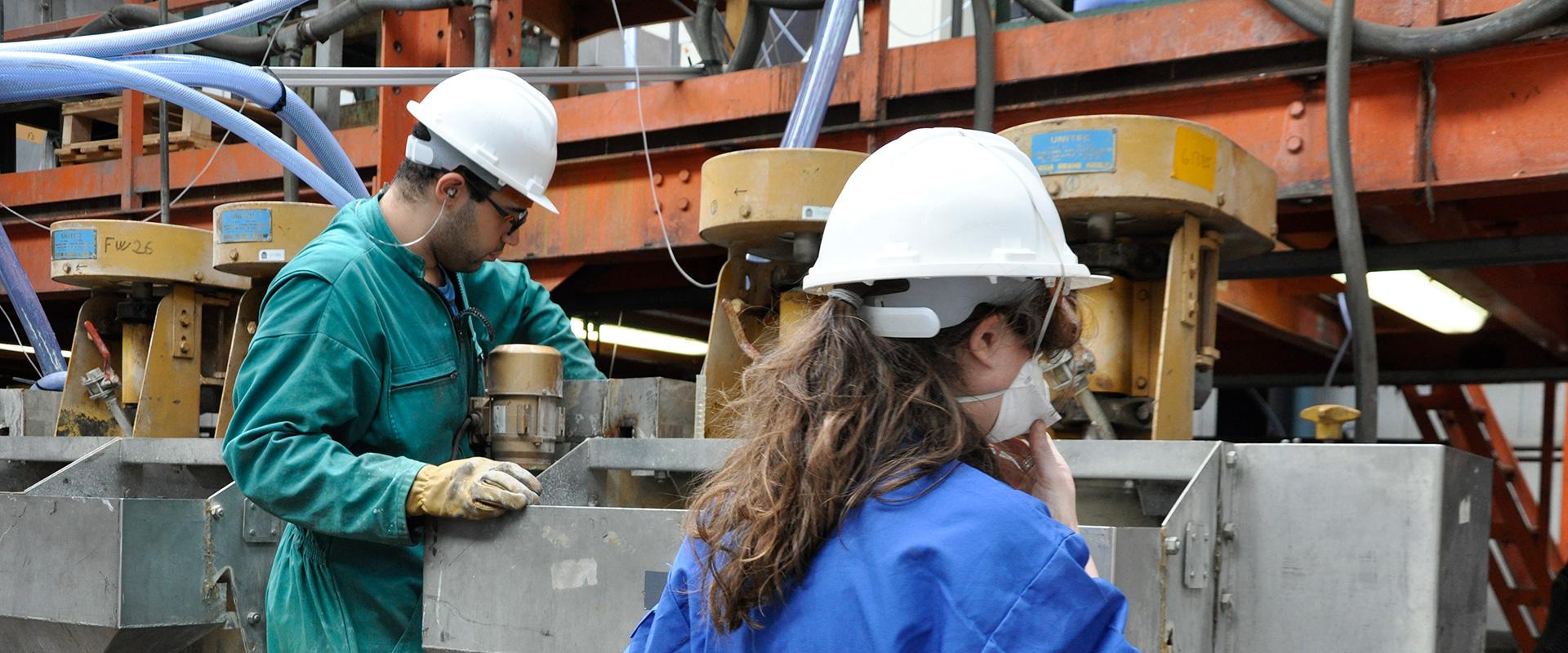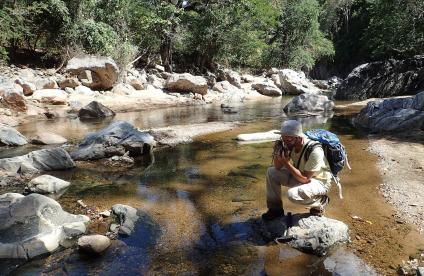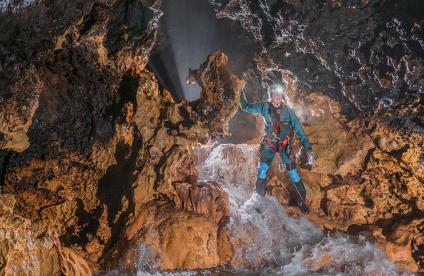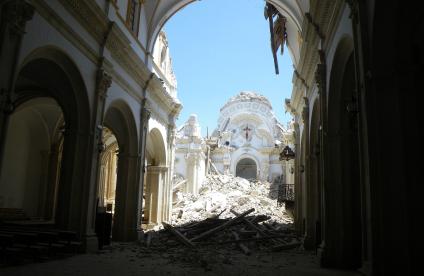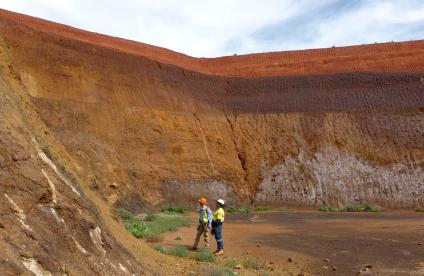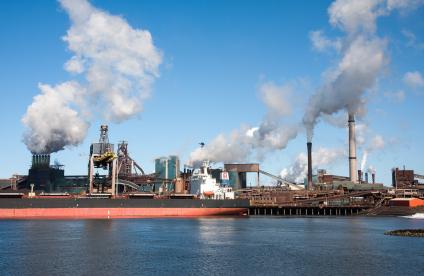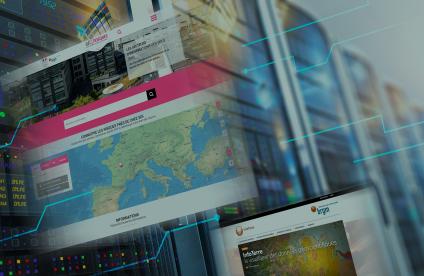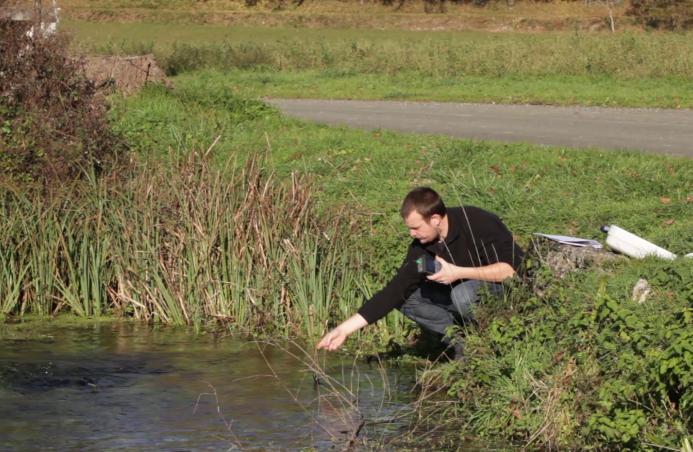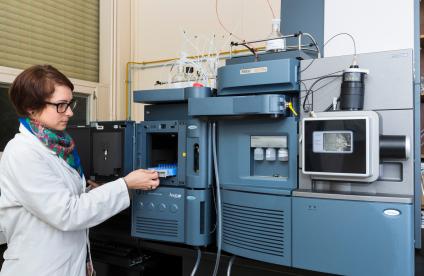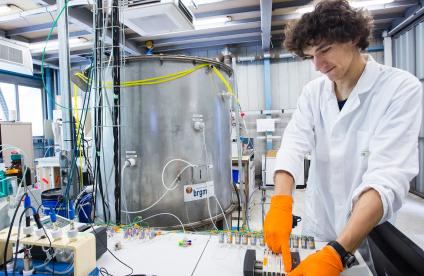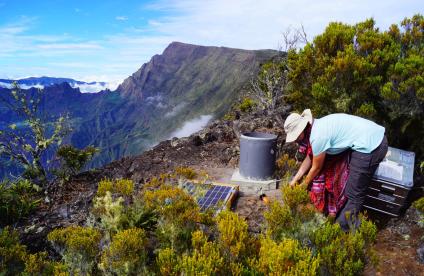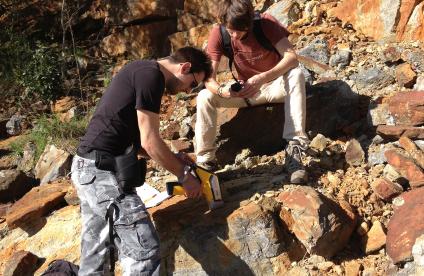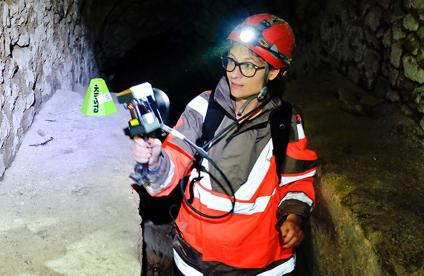At BRGM, there are two career categories:
- The scientific and technical professions which take place in a research-expertise continuum and address the key themes of the six scientific and socio-economic strategic goals around which BRGM's activities are organised. These core professions are the raison d'être of BRGM, the French geological survey, which is responsible for providing research, expert appraisals and innovation for the benefit of all, for the sustainable management of ground and subsurface resources and risks.
- The logistical support professions, which include management and administrative activities.
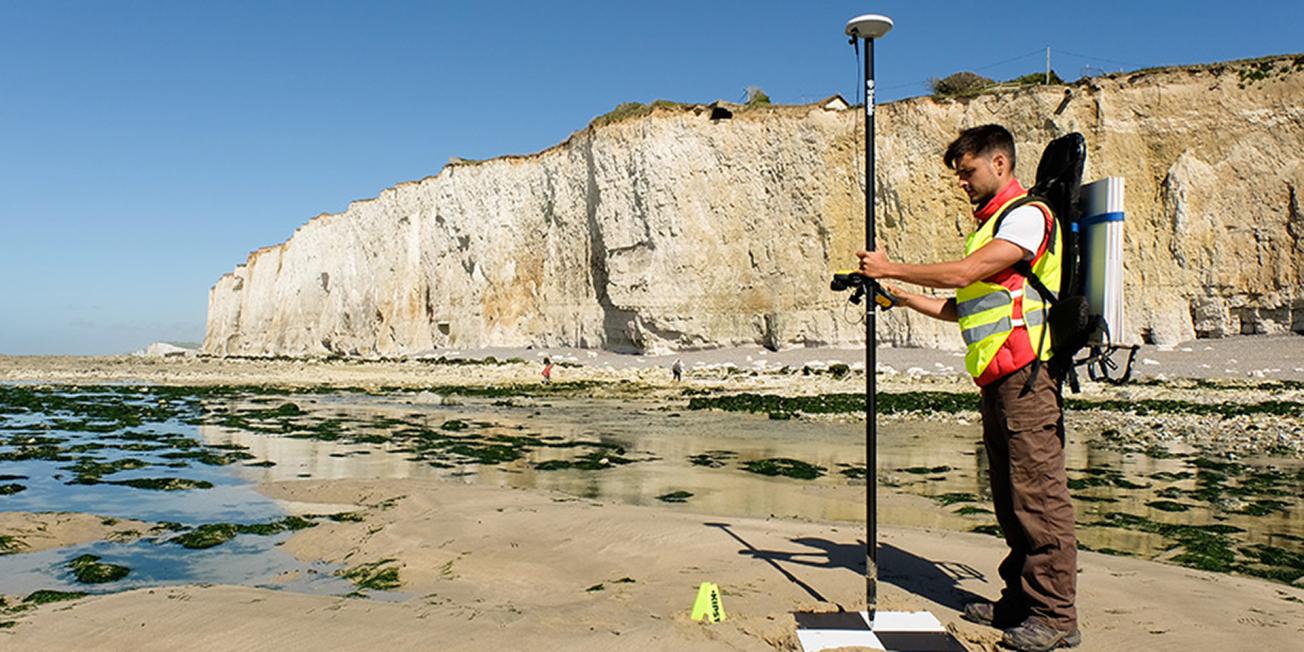
Near-centimetre location of targets for photogrammetry measurements using drones (Seine-Maritime, 2015).
© BRGM - Thomas Dewez
Complementary activities
These professions are closely linked in BRGM teams, whose members collaborate to carry out the research and scientific and technical expertise missions entrusted to BRGM, and who share the common principles of scientific excellence, economic efficiency and an enhanced work environment.

Scientific and technical professions: what it means to be a research engineer and technician at BRGM
The 6 major societal challenges that structure BRGM's activity
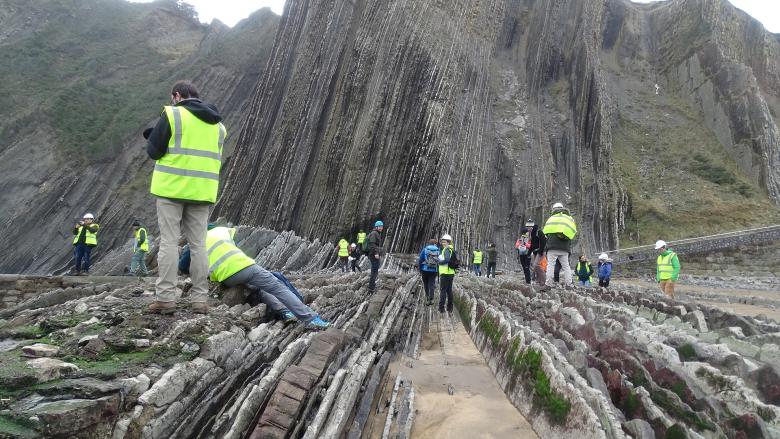
Cretaceous flysch from Zumaïa (Spain) visited during a winter school organised under the Orogen project.
© BRGM – T. Baudin
What kind of scientific and technical research and expert appraisal does BRGM do?
The activity evolves successively to allow for progressive and rewarding careers. It contributes to the threefold missions entrusted to BRGM:
- scientific and technological research on ground and subsurface issues,
- scientific and technical expert appraisal in support of government authorities and their policies,
- support for innovation and partnership with companies.
Initiative, innovation and creativity
The aim is to participate in, lead and then supervise and initiate the design and creation of new know-how and knowledge, innovative products, processes or services, to develop innovative research and/or the use of innovative techniques and approaches.
Scientific and technical production
This involves setting up, carrying out and conducting studies, expert assessments and scientific and technical projects of increasing scope and complexity and making an increasingly significant contribution to development of the activity and coordinating project teams.
Exploiting and promoting results
The aim is to publish and present, then coordinate the production of scientific and technical articles, expert reports, methodological or recommendation guide books, digital services, review articles, special issues, scientific and technical videos, etc.
Sharing scientific information
This involves participating in, leading and initiating scientific networks, presenting papers at national or international conferences, symposia and trade fairs, and contributing to BRGM's scientific mediation, particularly via digital media.
Supervising young researchers, passing-on knowledge and skills
The aim is to ensure that knowledge and know-how is shared and passed on to junior staff by providing university teaching or vocational training and supervising students: doctoral students, post-doctoral students, young researchers, work-study students and interns.
Testimonials from our research engineers
More than 100 technicians working in our regional divisions and delegations and in Orléans
At BRGM, our scientific technicians occupy a variety of positions including:
Archivists
They boast a set of skills allowing them to organise and monitor the selection, storage, destination and ultimate fate of the institution's documents. Archiving also involves identifying, keeping safe and maintaining available all the documents that bind the institution with regard to third parties or its future activities when a lack of such documents would pose a risk.
Chemists
They are tasked with designing, developing and implementing high-added-value analytical methodologies, contributing to laboratory methodologies for experimentation in the field (ground, water) and conducting analyses for all BRGM departments.
Physical Measurement Technicians
They are responsible for monitoring the operation of water management and gas measurement facilities, performing or monitoring any maintenance work, such as repairs, that might be required, and producing reports. All this is usually done with the help of specialist subcontractors in charge of the facilities.
Geomatics experts
They are called upon by project managers to draw up maps, drawings and diagrams using software packages (Qgis, Autocad) and populating and managing various geomatic, environmental and land-title databases. They are involved in the geo-referencing of the structures monitored through field surveys and help the surveillance team collect data.
Water and Risk Technicians
They are in charge of studying and monitoring the main aquifers (piezometric levels, pollution, hydrogeological potential, boreholes), assessing the geothermal potential of the subsurface in France and helping prevent natural and anthropogenic risks.
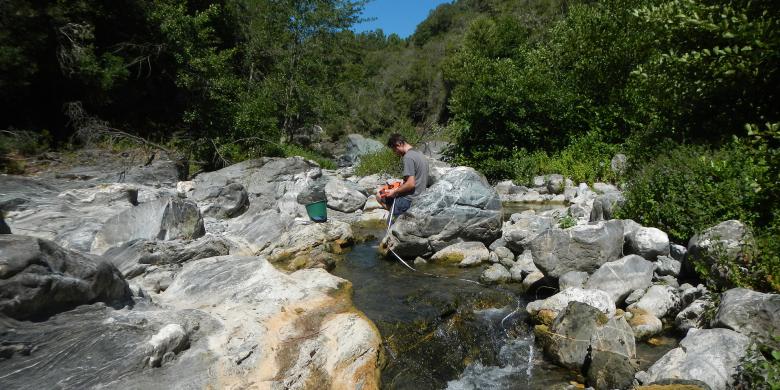
Measuring discharge rate by means of a saline tracer in the Tagnone valley (Corsica, 2013).
© BRGM - Marie Genevier
The roles of our technicians
The activity evolves successively to allow for progressive and rewarding careers.
Scientific and technical production
This involves participating in, carrying out, designing and supervising data acquisition campaigns in the field, pilot tests on industrial sites, experimental devices, and analytical developments according to each individual’s specific field of expertise and activity, while acquiring increasing autonomy.
Initiative, innovation and creativity
This involves contributing to the development and adaptation of new techniques or methods depending on the field of activity.
Sharing information
This involves participating in, maintaining and developing networks (subcontractors, suppliers, after-sales service, etc.), and presenting one's own field of activity and its corresponding techniques within BRGM and through outreach activities.
Supervising young researchers, passing-on knowledge and skills
The aim is to ensure that knowledge and know-how are shared and passed on to junior staff by providing university teaching or vocational training and supervising students (work-study students and interns).
Being a doctoral or post-doctoral student at BRGM
As the French Geological Survey, BRGM hosts around a hundred doctoral students each year under its PhD programme, in cooperation with university laboratories and companies.
Co-supervision of PhD theses is one of the cornerstones of BRGM's research activities. These theses are therefore an integral part of BRGM's scientific programmes.
BRGM also offers funding for post-doctoral contracts of 12 to 18 months.
Joining BRGM as a research engineer or technician
To become a BRGM technician, you need to have a diploma or degree attesting to two to five years of higher education.
To become a research engineer at BRGM, you must have either:
- a master's, engineering or grandes école degree attesting to at least 5 years of higher education
or
- a PhD
You must at least have had a first experience in your field of study to apply for junior/beginner job positions or up to 20 years of experience for senior jobs requiring expertise in several fields.

Work to support research at BRGM
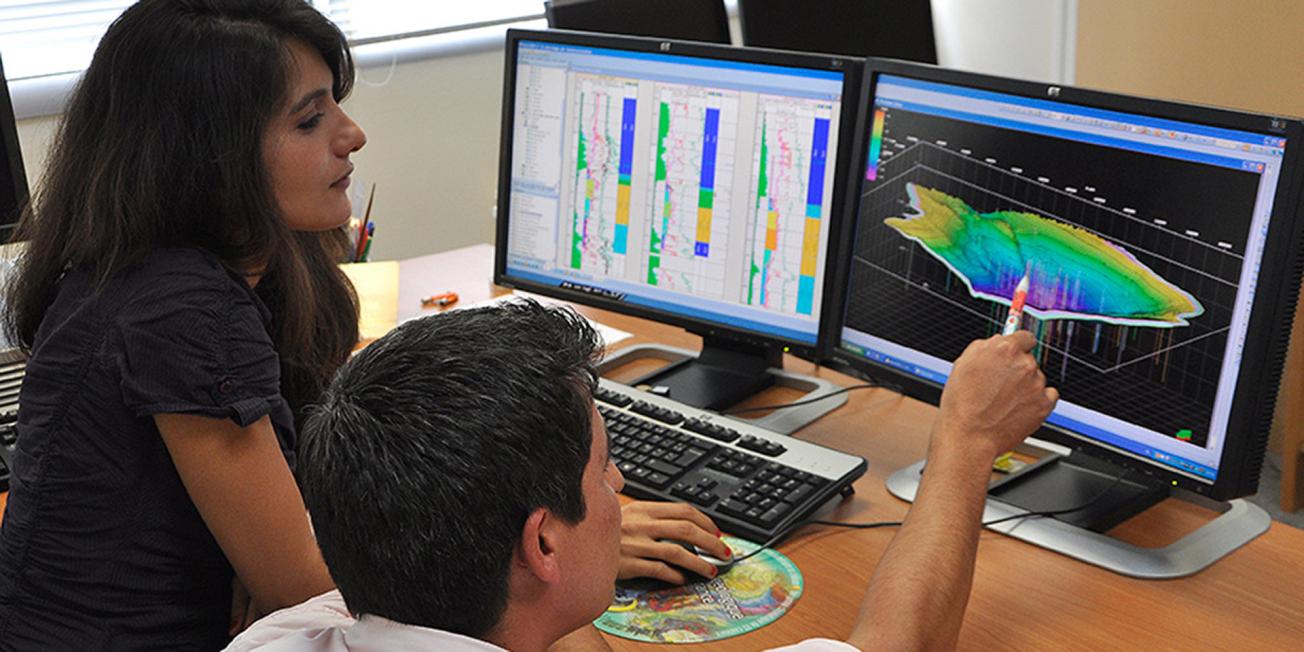
3D modelling techniques for the French Geological Reference Platform (RGF) programme (Orléans, 2011).
© BRGM - Patrick Desbordes
Supporting staff at the service of research
At BRGM, the people who provide support to scientists perform the following functions:
Finance
All the activities that organise financing for BRGM and make this financing possible, in compliance with legal, financial, fiscal and ethical rules. Their aim of being able to predict future reality is reflected in the preparation and monitoring of budgets, as well as in investment simulations.
(Public) procurement
A set of skills enabling products, services and supplies to be identified, selected and procured in accordance with the company's purchasing strategy and in compliance with the various applicable regulations.
Legal
A range of skills enabling advice to be provided in the fields of commercial, tax and customs law, business and company law, labour law, public procurement law, environmental and mining law, insurance law, and property and construction law, with the aim of safeguarding BRGM's activities, in terms of both drafting and negotiating contracts and managing disputes and litigation.
Human resource management
Human resource management encompasses all activities aiming to develop employees' skills to meet business needs and foster growth, as defined in the company's strategic policy, maintain the mobilisation and motivation of employees, involve managers in the coordination of teams, drive and steer the company's social policy, and guarantee compliance with obligations arising from social regulations in the areas of human resource management, hygiene, health, safety, and working conditions.
Information systems
A set of skills enabling BRGM's various entities to be provided with technical IT resources and support for their activities, with the aims of anticipating needs, ensuring the quality of services and optimising the budget.
Work environment
A set of activities that provide BRGM's various entities with the necessary support for the conduct of their activities: proposing, implementing and coordinating all the activities and work required for the proper functioning of all of BRGM's sites, with a view to working more efficiently, optimising costs and reducing the institution's environmental footprint.
Communication
Communication is a cross-cutting function that helps meet the communication needs of all BRGM stakeholders. The main mission of the communication function is to define and implement BRGM's communication strategy in order to boost the institution's reputation, enhance its image and disseminate information and knowledge in the area of geosciences to various internal and external audiences.
Secretariat
This is the first point of contact for employees and also for their external partners. It is an office-based role that consists in assisting other employees and staff members by dealing with their mail and telephone calls, drafting meeting reports, managing their schedule, formatting documents, filing records, organising travel, etc. It relieves some of their workload, particularly by helping organise their work, and is essential to the functioning of the team.

